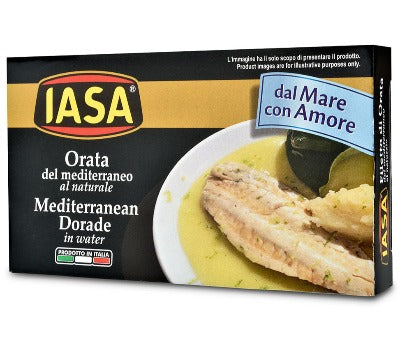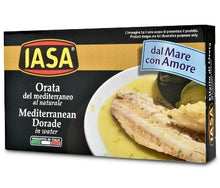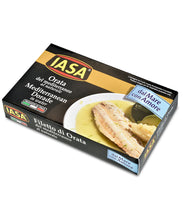Orata del Mediterraneo from IASA
Ittica Alimentare Salerno (IASA)
Regular price
$11.95
Sale
Delicate Mediterranean Dorade Packed in Water
Dorade—known by many names: orata in Italy, daurade in France and sea bream in the United States—is a white fish treasured for its flaky, tender texture and light, clean flavor of the sea.
To make this delicacy, the folks at IASA—one of our favorite Italian fish producers—start with sustainably-farmed dorade. The fish is gently steamed, and then hand-packed in cans with water, salt and a touch of lemon. This recipe reflects the tradition of restaurants along the Amalfi coast which serve the fillets simply with salads, sliced tomatoes, potatoes, and a generous drizzle of flavorful Italian extra virgin olive oil.
How to use
IASA's Mediterranean Dorade is stunning straight out of the tin. It elevates any salad you put it on (try substituting it for tuna in a classic Niçoise salad). Or use to make an easy yet elegant appetizer: Gently flake the fish, toss with Santidu extra virgin olive oil and season with Omnivore Salt. Serve on top of crostini alongside glasses of crisp white wine like Verdicchio or Vinho Verde.
The mild, clean flavor of orata lends itself to bigger, more aromatic pairings like Agrumato® citrus olive oils, wild fennel pollen and fragrant saffron. Try it in our recipe for Paccheri Pasta with Burst Cherry Tomato & Saffron Sauce.
About the producer
Retired naval captain Francesco di Mauro founded Ittica Alimentare Salerno (IASA) as one of the first companies to preserve the bounty of tuna and anchovies brought in by the local fishermen of Cetara, a village tucked away in a small cove of the Amalfi Coast. There are only a handful of companies left in Italy that package freshly caught fish according to high quality standards. And IASA is the only one that continues to do most of the work by hand: gutting and cleaning the fish, placing layers of anchovies in drums with sea salt and hand packing the anchovies in jars.
With an eye to the increased attention on sustainability, IASA decided to add a line of canned, local Mediterranean fish such as branzino and orata to their traditional products. IASA’s commitment to sustainability is evident through their research and development, with local fishermen, to choose fish varieties that are not on an endangered list.
Featured in these recipes:
More Info
- Producer
- Ittica Alimentare Salerno (IASA)
- Country
- Italy
- Region
- Campania
- Size
- 5.11 ounces net weight


